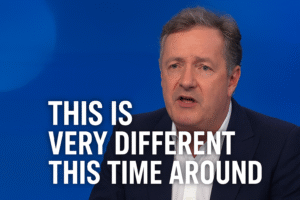Piers Morgan Signals Major Shift: “Very Different This Time Around”
Date: September 17, 2025
British broadcaster and columnist Piers Morgan is drawing attention for what many observers describe as a pronounced change in his public commentary. Having built a reputation for provocative, polarizing takes on political issues, Morgan recently told Mixed Signals (a media program) that “this time around” things are different — suggesting a shift in how he views U.S. politics, the media landscape, and his role in it.
What’s Changed
-
Viewing From the Outside
Morgan, who has followed U.S. politics for years, said that after his recent conversations and observations — including following the 2024 election, the conflicts in Israel-Hamas and Ukraine, and America’s changing internal divisions — he feels the “stakes” now are far higher than before. He claims that he no longer sees his usual role as just a commentator pointing out flaws but increasingly as someone who believes active critique and engagement are required. -
Media & Platform Evolution
Part of what “different this time” refers to is Morgan’s embracing of newer media platforms and formats. He has moved away from traditional, scheduled, linear TV shows towards longer-form, digital content (YouTube, podcasts, etc.) that allows for deeper diving and less constraint by format. Semafor+1 -
Political Observations
Morgan has expressed that recent U.S. administrations, global events, and domestic policies (tariffs, foreign war engagement, etc.) are creating a political environment where what once might have been considered fringe opinions are now entering mainstream discourse. He suggests that both the expectations of leaders and the level of public scrutiny — especially via social media — mean political moves that might previously have passed unnoticed are now under far more intense examination. Semafor+1 -
Public Opinion Shift, Especially in Conflicts
Perhaps most notably, Morgan has shifted in his commentary on the Middle East. Earlier, he largely accepted the prevailing narrative that Israel had a right to defend itself in certain ways. But as civilian casualties, humanitarian crises, and extended conflict drag on, Morgan has become more critical of Israeli military tactics, blockades, and the humanitarian fallout. He has described some of the actions as potentially “unjustified, unacceptable, probably illegal” and has warned that doing nothing is no longer defensible. The Nation Middle East
Why It Matters
-
Credibility & Influence: Morgan is well known for contentious media moments. A more nuanced or critical stance (in certain cases) can sway public discussion — especially among audiences who’ve long tuned him out or dismissed him.
-
Media Landscape Reflections: His shift may reflect a broader trend where media figures are less constrained by traditional norms (TV schedule, political alignment, editorial “safe zones”) and more willing to challenge previously accepted narratives.
-
Public Sentiment: His changing views mirror growing public discomfort with prolonged conflict, humanitarian impact, and perceived lack of accountability in some political/domestic policies. As those concerns grow, commentators like Morgan adapting their stance can both reflect and amplify that sentiment.
Criticism & Reactions
-
Skeptics say this kind of shift is not unusual for media personalities trying to stay relevant or responding to changes in their audience. Some accuse him of being reactive rather than principled.
-
Supporters see this as overdue. They argue his willingness to speak out — even changing earlier opinions — is a sign of maturity and courage.
-
Observers note that Morgan’s platform gives him a wide audience, but also means any change in tone is highly visible and subject to intense critique.
What’s Next
-
Morgan is likely to continue using long-form content (YouTube, podcasts, debates) to explore controversial topics in greater depth.
-
His future commentary may press harder on issues like war, civil rights, media ethics, and political polarization — possibly more from a position of critique than from traditional media alignment.
-
How his audience responds (both long-time followers and critics) could influence whether this “different time” truly represents a lasting pivot or simply a temporary recalibration.
If you like, I can send you Morgan’s exact quotes where he says “different this time” and people’s reactions (in UK & U.S.), plus audio/video links. Want me to pull those together?

